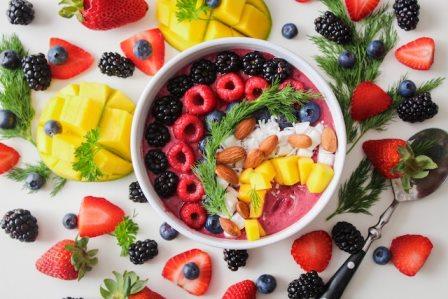Healthy Skin Foods
Table of Contents

Healthy Skin Foods
Our skin is the largest organ in our body and plays an important role in protecting us from external elements. While most people rely on skincare products to maintain healthy skin, the food we consume also plays a vital role in maintaining our skin health.
The foods we consume provide our skin with the essential nutrients it needs to repair and regenerate itself. In this article, we’ll take a closer look at some of the foods that are particularly beneficial for maintaining healthy skin.
Fatty Fish
Fatty fish, such as salmon, mackerel, and sardines, are excellent sources of omega-3 fatty acids. These healthy fats help to nourish the skin by keeping it hydrated and reducing inflammation. Omega-3s also help to protect the skin from damage caused by UV rays.
Avocado
Avocado is a great source of healthy fats, vitamins C and E, and antioxidants. These nutrients help to nourish the skin, improve skin elasticity, and protect the skin from damage caused by free radicals.
Nuts and Seeds
Nuts and seeds, such as almonds, walnuts, and sunflower seeds, are rich in vitamins E and B, as well as healthy fats and antioxidants. These nutrients help to nourish the skin, reduce inflammation, and protect the skin from damage caused by free radicals.
Berries
Berries, such as blueberries, raspberries, and strawberries, are rich in antioxidants, which help to protect the skin from damage caused by free radicals. Berries are also a good source of vitamin C, which is important for collagen production, a protein that gives the skin its elasticity.
Leafy Greens
Leafy greens, such as spinach, kale, and broccoli, are rich in vitamins A and C, as well as antioxidants. These nutrients help to nourish the skin, reduce inflammation, and protect the skin from damage caused by free radicals.
Sweet Potatoes
Sweet potatoes are an excellent source of beta-carotene, a precursor to vitamin A. Vitamin A is important for maintaining healthy skin as it helps to regulate skin cell turnover and prevent dry, flaky skin.
Tomatoes
Tomatoes are a great source of lycopene, an antioxidant that helps to protect the skin from damage caused by UV rays. Lycopene also helps to improve skin texture and reduce inflammation.
Green Tea
Green tea is rich in antioxidants, particularly polyphenols, which help to protect the skin from damage caused by free radicals. Green tea also has anti-inflammatory properties, which can help to reduce redness and inflammation in the skin.
Water
While not a food, water is essential for maintaining healthy skin. Drinking enough water helps to keep the skin hydrated, which is important for maintaining skin elasticity and preventing dry, flaky skin.
In conclusion, incorporating these healthy skin foods into your diet can help to nourish your skin from the inside out. Eating a balanced diet that includes a variety of fruits, vegetables, nuts, seeds, and fatty fish can help to protect your skin from damage, reduce inflammation, and keep your skin looking healthy and radiant.
What to avoid
In addition to consuming healthy skin foods, there are also certain foods that you should avoid or limit to maintain healthy skin. Here are some examples:
- Processed Foods: Processed foods are often high in sugar, unhealthy fats, and sodium, which can lead to inflammation in the body and contribute to acne and other skin issues. It’s best to limit your intake of processed foods and focus on whole foods instead.
- Sugary Foods: Consuming too much sugar can also lead to inflammation in the body, which can contribute to acne and other skin issues. Limit your intake of sugary foods, such as candy, soda, and pastries.
- Fried Foods: Fried foods are often high in unhealthy fats and can contribute to inflammation in the body, which can lead to skin issues. It’s best to limit your intake of fried foods and focus on healthier cooking methods, such as baking or grilling.
- Dairy Products: Some studies suggest that consuming dairy products, such as milk and cheese, may contribute to acne and other skin issues in some people. If you notice that your skin is sensitive to dairy, you may want to consider limiting your intake or switching to dairy alternatives.
- Alcohol: Consuming alcohol can dehydrate the skin and contribute to inflammation, which can lead to skin issues. It’s best to limit your intake of alcohol and stay hydrated by drinking plenty of water.
In addition to avoiding or limiting these foods, it’s also important to maintain a healthy lifestyle, which includes getting enough sleep, managing stress, and exercising regularly. By taking care of your overall health, you can help to maintain healthy, radiant skin.
